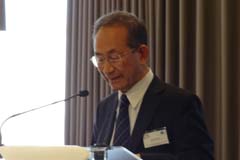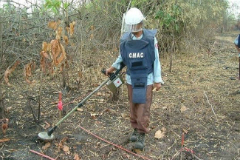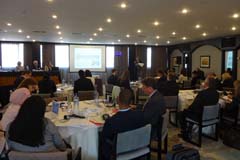Triangular Cooperation Can Contribute to the SDGs' - JICA-RI Senior Research Advisor Hosono Speaks Based on Japan's Experiences
2016.06.20
Akio Hosono, senior research advisor at the JICA Research Institute, attended the International Meeting on Triangular Co-operation held in Lisbon, Portugal, on May 19, 2016. He emphasized that triangular cooperation can play an important role in achieving the SDGs.
South-South cooperation is defined as a developing country supporting another developing country, and triangular cooperation is defined as this South-South cooperation being carried out together with an Organisation for Economic Co-operation and Development (OECD) donor country. This meeting was held for practitioners and government stakeholders engaged in triangular cooperation to share knowledge and experience relating to triangular cooperation. About 100 development cooperation stakeholders attended from the OECD's Development Cooperation Directorate, which sponsored the event, along with the Institute for Cooperation and Language of Portugal the United Nations Office for South-South Cooperation, the U.N. Food and Agriculture Organization, the U.N. International Labour Organization, the Ibero-American General Secretariat, JICA, USAID, GIZ and other national ODA agencies, Indonesia, South Africa, Morocco, Brazil, Chile, Latvia, Costa Rica and other countries.

JICA-RI Senior Research Advisor Hosono
In his keynote speech, Hosono listed characteristics of the SDGs and said, "The scope of the framework has become much broader in the SDGs than in the MDGs," and "Regional and global approaches are highly needed in the SDGs as global challenges do not stop at national borders."
He gave the following analysis: "The SDGs put more emphasis on 'global partnership' involving both the North and the South as well as multi-stakeholders such as the private sector, academia and CSOs. Therefore, in our pursuit of achievement of the SDGs, transformative approaches are needed which would have regional and global impacts by mobilizing resources from various actors."
"Triangular cooperation has indispensable roles to play in the implementation of the SDGs with its three features. First, it encourages knowledge sharing and co-creation among actors with different backgrounds. Second, through a series of activities, it contributes to the development of mutual trust and partnership among relevant actors that would advance concerted efforts among countries. Third, it is a process of long-term capacity development," he said.

A staff member of CMAC searches for land mines
Also, he pointed out that these features of triangular cooperation match the Japanese philosophy of development cooperation. This philosophy, mentioned in Japan's Development Cooperation Charter, involves the following elements: respect for autonomy, dialogue and collaboration, and mutual learning. In the context of triangular cooperation, he talked about the specific role of developed countries, giving the following JICA examples: the Cambodian Mine Action Centre's (CMAC) cooperation with Colombia and Angola, which suffer from land mines; Chagas Disease countermeasures carried out with the Pan American Health Organization of World Health Organization (PAHO/WHO); and the Triangle of Hope project that uses the experience of Malaysia to encourage investment in Zambia.

Participants listen to presenters
Hosono explained that JICA served as a facilitator and catalyst in triangular cooperation between Cambodia and Angola, between Central American countries and regional international agencies and between Malaysia and Zambia, and said it can promote dialogue and interaction among developing countries. Based on this, Hosono said that in the SDGs era, it is important for the international community to support the establishment of centers of excellence such as CMAC.
In the session following the keynote speech, there was debate on the actual practice of triangular cooperation, the elements of its success, and on methods of promoting triangular cooperation. Regarding methods of promoting triangular cooperation, participants expressed the opinion that calling for participation by the private sector and NGOs is important, as is open dialogue among actors.
The meeting ended with participants affirming that they will take advantage of the Global South South Development EXPO and the High-Level Meeting of the Global Partnership for Effective Development Co-operation (GPEDC) in November, 2016 to work out how triangular cooperation can contribute to achieving the SDGs and how to promote triangular cooperation.
Hosono said JICA has been deeply involved in promoting triangular cooperation for many years. In this field, JICA's contribution is not limited to implementation of triangular cooperation at the field level, but extends to international debates based on JICA-RI's case studies, he said.

事業事前評価表(地球規模課題対応国際科学技術協力(SATREPS)).国際協力機構 地球環境部 . 防災第一チーム. 1.案件名.国 名: フィリピン共和国.

事業事前評価表(地球規模課題対応国際科学技術協力(SATREPS)).国際協力機構 地球環境部 . 防災第一チーム. 1.案件名.国 名: フィリピン共和国.

事業事前評価表(地球規模課題対応国際科学技術協力(SATREPS)).国際協力機構 地球環境部 . 防災第一チーム. 1.案件名.国 名: フィリピン共和国.

事業事前評価表(地球規模課題対応国際科学技術協力(SATREPS)).国際協力機構 地球環境部 . 防災第一チーム. 1.案件名.国 名: フィリピン共和国.

事業事前評価表(地球規模課題対応国際科学技術協力(SATREPS)).国際協力機構 地球環境部 . 防災第一チーム. 1.案件名.国 名: フィリピン共和国.
scroll